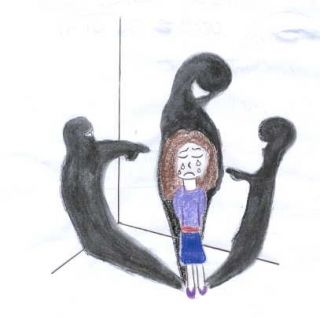Bullying
Stand Up To Self-Bullying
Approach yourself with compassion for a happier life.
Posted May 28, 2012

Do you think of yourself as a nice and caring person to others; yet simultaneously criticize and push yourself mercilessly? If so, I hope you’ve given serious consideration to the inherent contradiction in this. It’s important to acknowledge that you are bullying an extremely important person—you! Instead of continuing this self-destructive behavior, consider learning to treat yourself as well as you treat others; particularly when you are struggling or distressed. The best way to do this is by relating to yourself with compassion.
Briefly stated, you can develop self-compassion by doing the following:
Acknowledge what it feels like to be a victim. Allow yourself to really feel what it’s like to be treated so harshly. Note how it pulls you down.
If you become wrapped up in your self-criticisms, consciously refocus on what it feels like on the receiving end of those criticisms. If you have difficulty doing this, imagine how a caring person (such as a good friend) would treat you more positively. They wouldn’t criticize you, because they see you in a kinder light. The idea here is that you understand the damage of self-criticism and so begin questioning yourself when you do it.
You might believe that you should stop being a wimp and “just get over” your emotional pain. In this case, you would be supporting your “inner bully”—and hurting yourself more. Feelings are part of who you are (as they are a part of all people), and they cannot be ignored or criticized without harming yourself. To feel fully happy, you must connect with, accept, and relate in a caring way to all of your experiences, even difficult ones. This can be a difficult concept to understand; so if you want to learn more about it, check out: The First Step To Meeting Your Personal Goal.
Gain self-awareness. Here’s the part where you think this through rationally. Remember early life experiences when you were hard on yourself; and choose to re-experience emotions from that time. Hold onto them until you have a really good sense of them. Then reflect upon how life events influenced you to be so hard on yourself. When did you first start to do this? And, what purpose did it serve? For instance, you might have been an anxious child who was driven to be perfect; and/or, you might have been a child who felt that you needed to excel at school or in sports to get your parents’ approval. In either case, you might find that you were using self-criticism as a way to drive yourself; and ultimately gain the acceptance you craved.
Understand your self-bullying with perspective. Pull back, and observe this earlier experience from your current, adult perspective. Recall how you needed acceptance and support. So, you pushed yourself and did the best you could at the time to have those needs met. Unfortunately, although your goal was a positive one, driving yourself to do better ultimately made you feel worse about yourself.
Approach yourself with understanding and compassion. Hopefully, in going through this process, you will feel a natural compassion toward that younger you. If you slip back into self-criticism (your younger self’s perspective), consider again how a good friend or nurturing mother would respond to that younger you – no doubt with compassion.
Finally, make note of how you continue to use those same childhood strategies in your current life. The way you coped back then became a part of you, so it is what you continue to do now. Really think about how this is your way of helping you—even though it is backfiring. By understanding this, you will hopefully understand your “inner bully” and be free to see yourself from a different, kinder perspective.
Without such strong self-criticism, you should be more able to look to the object of your self-criticism (e.g. weight, work performance, likeability) with compassion. You can tend to yourself, just as you tend to others—with caring and support. Of course, this new way of responding will take practice. But, over time, the self-bullying will diminish in power and frequency. Self-compassion will grow in its place. And, along with this change, you will find yourself able to lead a happier and more fulfilling life.
Dr. Leslie Becker-Phelps is a clinical psychologist in private practice and is on the medical staff at Somerset Medical Center in Somerville, NJ. She also writes a blog for WebMD (The Art of Relationships) and is the relationship expert on WebMD’s Relationships and Coping Community.
If you would like email notification of new blog postings by Dr. Becker-Phelps, click here.


